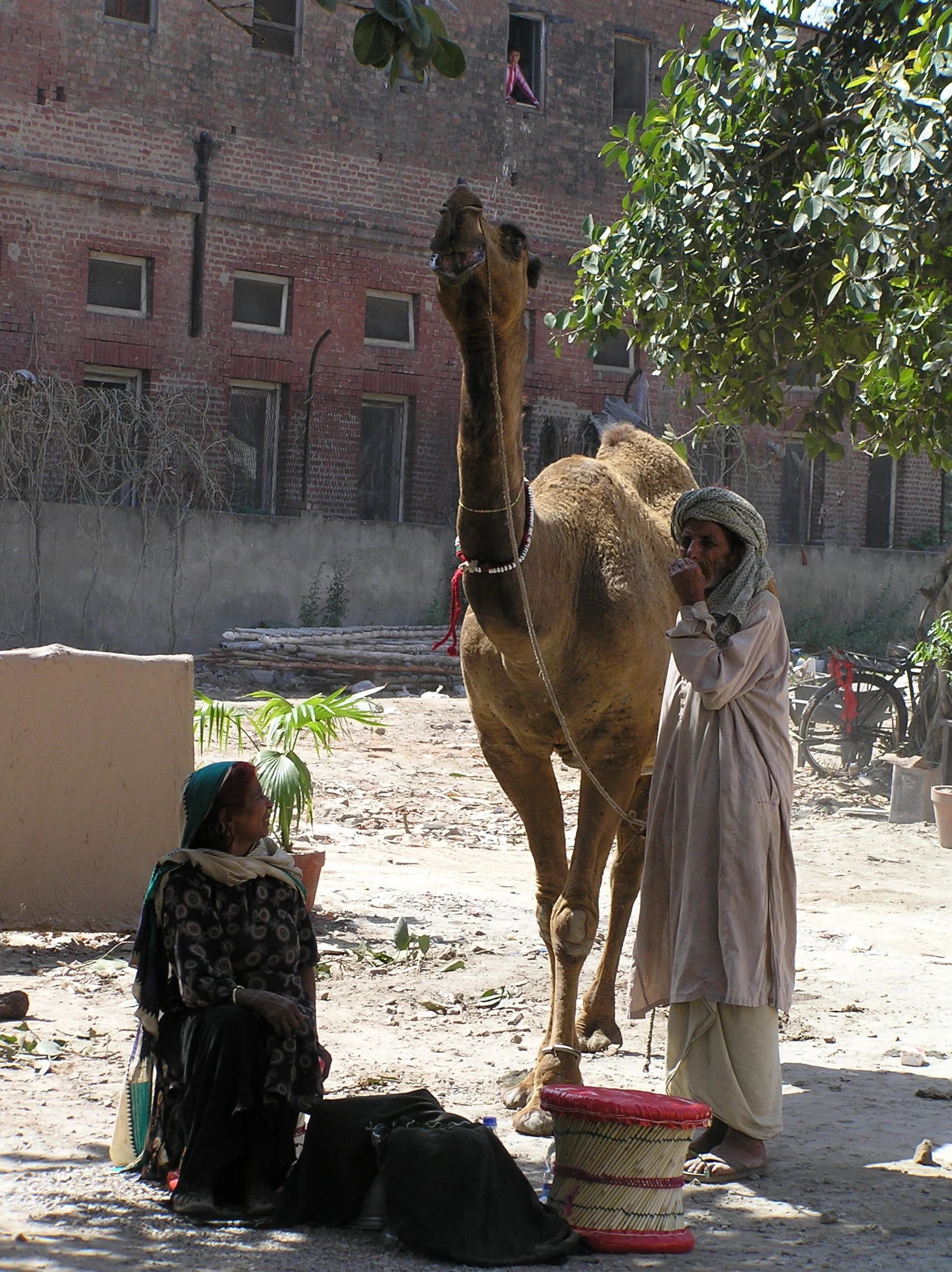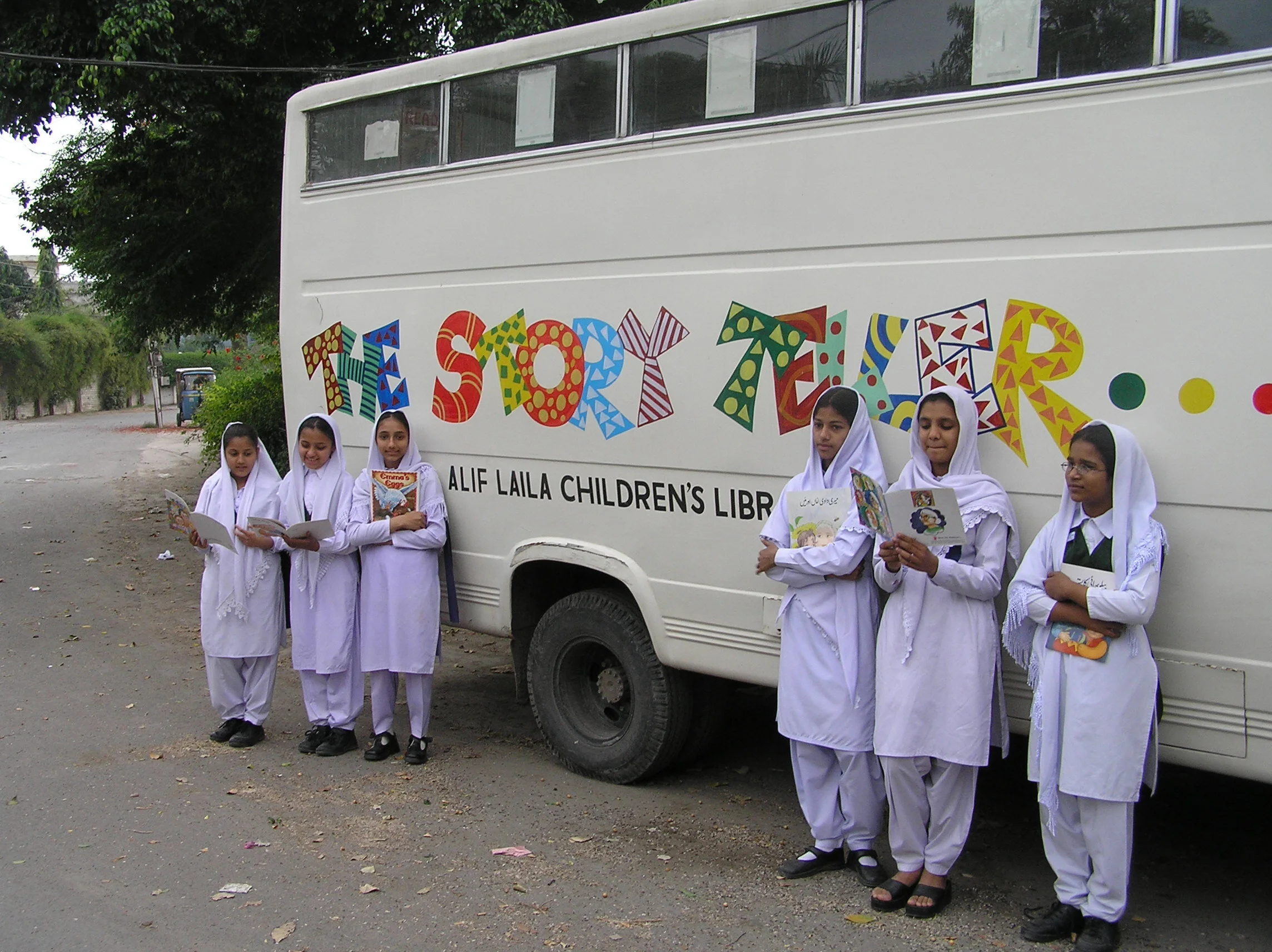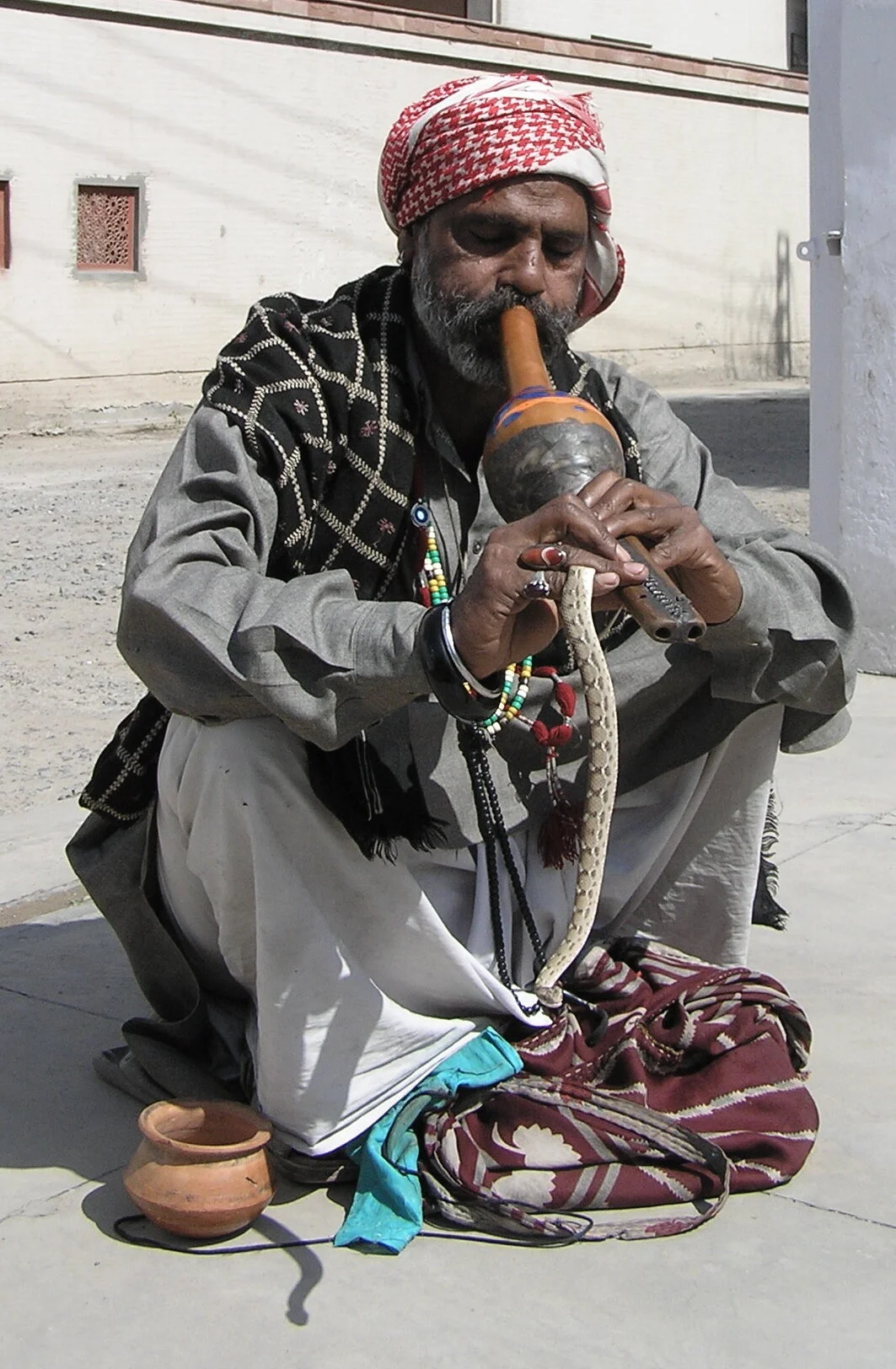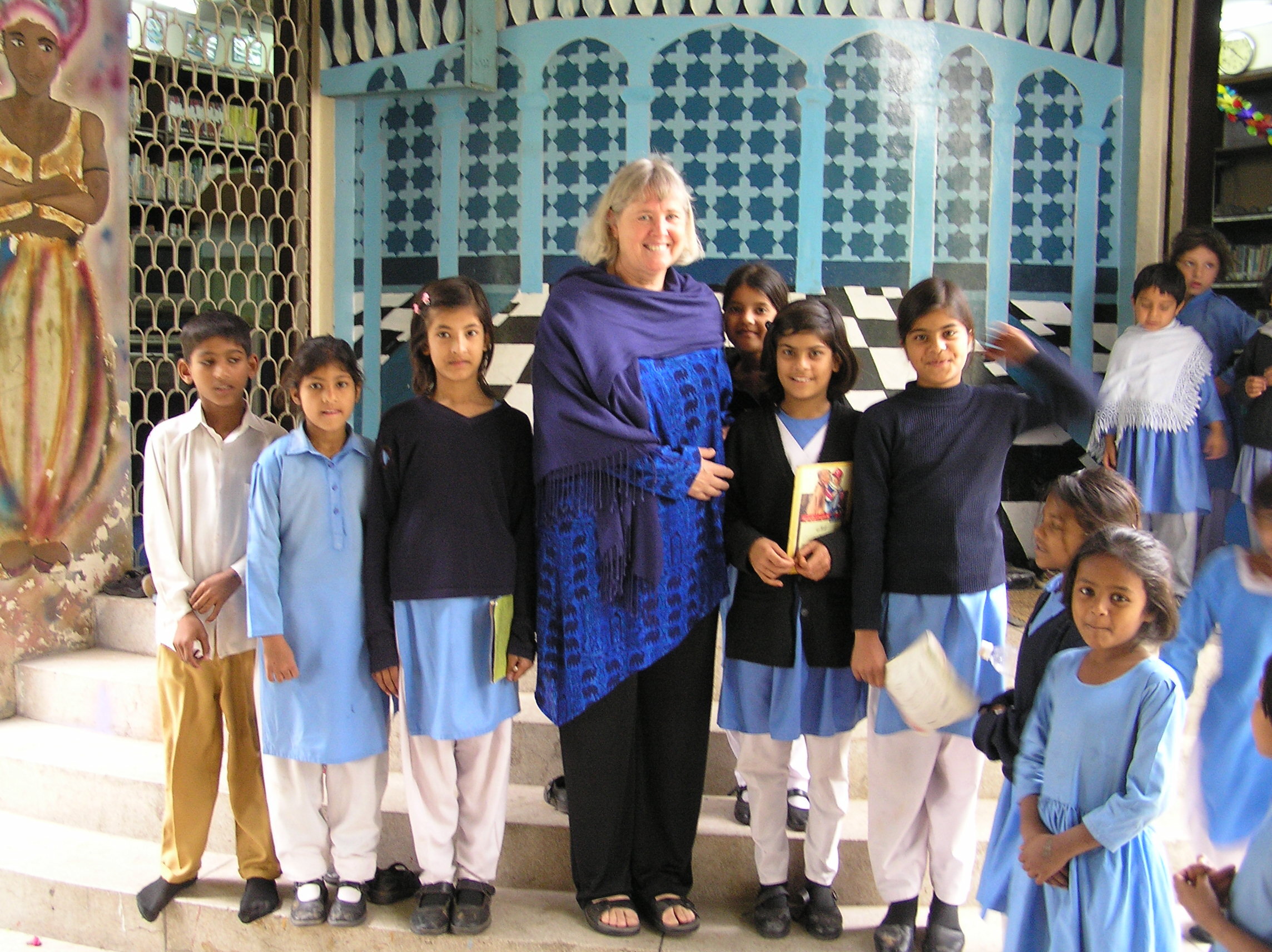Lahore Library
The Main Branch of the Public Library of Lahore is an impressive, white building with pillars outside and arched, painted ceilings inside. Dark wood paneling and rows and rows of bookcases, chandeliers and intricate details make it a haven for booklovers. An Urdu sign in copper over each door said 'Read, read, read' - an order given by Mohammed himself.
After our visit, we step outside, into 30º C heat. A group of dancers in colourful costumes is performing right behind the library. As soon as they see my pale face, they crowd around, smiling and dancing for me. I am still the only westerner.
Behind the museum we spot a camel with a tiny baby which sucked on my fingers! A woman is cooking on a fire in the dust.
At home, Leila asks me to help write a picture book for Pakistani children, to show them how libraries work and the joy of reading. This amazing woman works tirelessly with schools, runs a library program and cooperates with Safe The Children UK on bringing literacy standards up for all children in Pakistan. "We have an oral history, not one of books," she explains, and is looking for help to show people the importance of books and reading. We brainstorm book ideas. Eventually I write a story and read it to her. We both cry so I think it's working.
Alif Laila, Leila's library project, is an inner-city library building which is absolutely lovely. The round building is painted with scenes from Tales of 1001 Nights, which is what 'Alif Laila' means. It is housed in a lovely park-like setting. A school bus with sayings like "Readers are Leaders" etc., picks up children from different schools that don’t have libraries and no books other than text books. At home these children are not exposed to reading either. Most come from poor families. In the library they are read to, and can take books home. One class consists of about 60 children here and 2 classes come at a time.
After stories, the children go to another building which houses the offices of the Alif Laila project and has art rooms and a computer lab (with 3 languages on the keyboard!).
This is the only opportunity these children have to learn typing and using the internet. My friend says "Like Sheherazade of Arabian Nights, who had to save her life by finding stories, so we have to save our life all the time by finding funding and sponsors." I wonder if learning the skills of reading and typing might not also save the lives of some of these girls.
Many of the school children who come to the library are girls. They are incredibly sweet and kind. I read my Emma the Chicken books to over 100 kids. Leila translates into Urdu because these are young kids just learning English, and only speak Urdu.
We share our picture book concept with someone from Save The Children who thinks they can publish it. It will then be distributed for free to children across Pakistan. An exciting project! I also agree to do workshops for teachers and students on writing and using books in the classroom.
Treasure Hunt is the picturebook we ended up creating, published by Save The Children, UK
The Alif Laila project encompasses hobby club and mobile libraries. It is constantly growing and bringing more opportunity for literacy. They now also use rickshaws as mobile libraries and even have a camel library.
After sharing books with the children at the library, we leave for a different part of town. The streets get narrower and narrower. We walk, with small shops on either side of the street, each one just a small square. Each store has its own specialty: embroidery, bags, table linens, kitchen items, shoes, food. The street gets so narrow it is maybe 1.5 meters wide and still rickshaws and mopeds come honking along. The alley is packed with people yet no one bumps into another. I ask if I should be watch out for pickpockets and am told that this does not happen here. In fact, my friend said that she had sometimes forgotten her purse in a shop and found it still sitting there much later.
Leila told me that, once, she was shopping in an area where the shopkeepers spoke no Urdu. She had made a purchase in a shop and a little while later a man came running and shouting after her. She didn't know what he was calling and walked away faster. But the man kept chasing her. When he finally caught up, he panted "For heaven's sake, don't you want your change?!" and handed her some money back…
I am told it is perfectly safe for a woman alone to walk here at night. We walk and walk along the narrow streets, up one alley and down another. We get lost a few times in the labyrinth of shops. The sky gets darker, lights come on. Women wearing shawls of all colours, men in long tunics, some with turbans. I totally feel like I was in a scene of Arabian Nights. A coconut vendor sold slices of fresh coconut and coconut juice. There’s a strawberry vendor, a man who dyes cloth, and a wool shop where the walls are lined in rainbows of wool. A knitter's paradise. I bought several skeins of cotton which were placed onto an scale with copper weights balancing the scale to determine the price.
Everywhere around the city are tall skinny towers. Five times a day there is a long chant broadcasted that is a call to people to pray and to stay "on the straight path”. The women cover their hair, and so do I. “It is a time to reflect on what we are doing,” says my friend.
The carpet salesman
Around lunch time we have ‘tea' - tea with milk and sugar, perhaps some fruit, yogurt or a cheese sandwich. Around 3 PM we eat a hot meat - lentils, rice and round flatbread. Then at 5-6 it’s tea again and dinner is around 9 PM. When they tell me "take this, it's not spicy" I am learning that it will merely clear my sinuses. Anything stronger and I have smoke coming out of my ears.
On our drive home we suddenly spot a carpet salesman. I tell Leila how much I want to spend and she deals with the salesman in Urdu until we agree on a rug and a price. Now I just have to fit a small carpet in my suitcase…
The snake charmer
There are so many fascinating street vendors, it makes me feel like I'm in the Middle Ages. Each shop in the dusty sunlight is worthy of a painting. When I need some elastic to put in the waist of my new pants (shalwar), Leila says 'OK', we will buy some.' I thought we'd go to a shop but we drive around until she spots the roaming vendor. He carries a long stick horizontally across his shoulders. From the stick dangle rows and rows of useful things: laces, brushes, cloth, safety pins, sewing supplies, scissors and much much more. They’re also pinned to his coat and hanging four rows deep. He dug up packages of elastic and, when we paid, he had no change so gave her a bundle of safety pins instead.
Suddenly Leila cried "Quick Margriet, go look!" and behind our car a man has appeared out of nowhere: a snake charmer! He carried a large bag and a flute and asks me if I want to see the snake dance. Of course I said yes! and quickly grab some money for him. He unties the cloth lid of a small stone jar. Out comes a little snake which he put on the ground and starts to play. The flute sounds cool and it is a surreal experience to watch a real snake charmer. They all tell me that snake charmers are very rare these days (which I believe, because how many have you seen lately?) so I was very lucky indeed.
In my next and last post about Pakistan I will take you along to a fairy tale wedding! Meanwhile, here are links to help you learn more about Alif Laila and its worthy literacy projects. If you are a classroom teacher, you can support Pakistani children through small donations:
https://www.globalgiving.org/projects/bike-library-for-300-community-children/
https://www.globalgiving.org/projects/projects-on-the-go-for-girls/
To learn more about Alif Laila or to help sponsor it, click here: http://www.aliflaila.org.pk
A related, equally fabulous project is from The Institute for Cross Cultural Exchange, which published folk tales, puts books in the hands of many children, including Canada and Pakistan: http://www.iceeducation.org/indexR.html
For recommended books about Pakistan, click here then scroll down to P for Pakistan.










